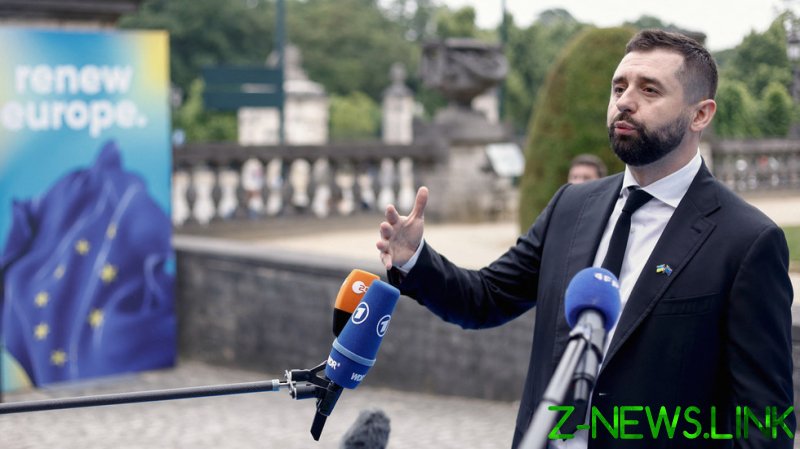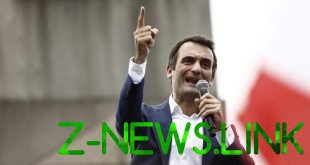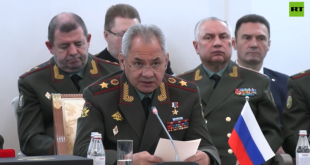
A few days ago, President Vladimir Zelensky’s most important political ally David Arakhamia gave a long interview to TV presenter Natalya Moseichuk. Both are heavyweights of Ukraine’s public sphere, with widespread recognition and significant influence.
Moseichuk’s main platform is the television channel 1+1. Arakhamia heads the parliamentary faction of the ‘Servant of the People’ party, which is Zelensky’s machine and, as such, controls Ukraine in a de facto authoritarian manner.
Bound to attract attention, the interview has done more: Due to Arakhamia’s unguarded (or deliberately revealing?) account of real yet missed opportunities to reach an early peace agreement in the full-scale war between Moscow and Kiev (and its Western sponsors and exploiters), it has caused a sensation.
Regarding the peace negotiations that took place in Belarus at the end of February and the beginning of March 2022, Arakhamia tells Moseichuk that the Russian delegation had one “key aim”: to make Ukraine accept neutrality and give up on NATO membership. In Arakhamia’s own words, “everything else” Russia talked about, such as demands regarding “denazification, Russian-speaking populations, and blah-blah-blah” was merely “cosmetic political seasoning.”
Let that sink in: Here is a prime negotiator for Ukraine and one of the Zelensky regime’s top men stating explicitly that all that peace really required at that very early stage in the large-scale war was Kiev committing to neutrality and giving up on its NATO ambitions. The war could have stopped in the spring of 2022; that is, one-and-a-half very bloody years ago. And for Kiev, this would have come at the price of giving up on a NATO ambition that is based on a false promise encapsulated in the foul compromise of the 2008 Bucharest summit. A pledge which the West has no intention of keeping, as demonstrated again at the 2023 Vilnius summit.
Arakhamia’s admission proves, once more, that there have always been viable alternatives to war. Western information warriors still denying this empirically established fact simply refuse to face their own terrible responsibility for stonewalling negotiations throughout. Likewise, Arakhamia demonstrates that everyone in Ukraine and the West who insisted that Moscow’s war aims were maximalist (whether to obliterate Ukraine as a state or to march right through it to, at least, Berlin) were flat out wrong, whether by mistake or on purpose. At least, that’s if we believe Arakhamia, who had direct experience with real representatives of Russia and not the fantasy creatures populating the minds of all too many Westerners, from Yale to Berlin. And note: Arakhamia has absolutely no reason to embellish Moscow’s record.
Or, for that matter, inclination. In the same interview, he occasionally uses the racist epithet “orcs” for Russians and displays that trademark arrogance that plays so well with Western visitors and has cost Ukraine so much. Arakhamia has made himself believe that his team had the advantage of 21st-century technology (by which he means Zoom and WhatsApp), while the Russian delegation was stuck in the 19th century (using secure landline phones to communicate with Moscow). Of course, such technology first emerged during the 1940s, but that’s what the man said.
Recognizing that his Russian interlocutors were well prepared, unlike their Ukrainian counterparts, who improvised, he also pats himself on the back for “disrupting their schemes,” i.e. dragging the negotiations down to a level at which the designated “Banderite” (his term) in the Ukrainian delegation gave tubthumping speeches just to make the Russians “go pale.”
“But what about territory?” you may ask. In the same interview, Arakhamia states that, at that point, the Russian negotiators were ready to “go back to where they were,” presumably to the pre-24 February borders. Put differently, not only would the war have ended quickly, but Ukraine would also have kept all those territories that Russian forces have taken since then and those they are now likely to take in the future. Kiev would have had to give up on Crimea and the Lugansk and Donetsk People’s Republics, areas whose inhabitants largely do not want to be part of Ukraine. Compared to what has happened since then, that would have been an easy way out.
The West, in this scenario, would have avoided the very damaging proxy war defeat that is now hanging over it. Everyone would have been better off economically as well. Obviously, that applies most of all to Ukraine, which is a devastated shadow of its former – already poor – self, propped up by Western aid (for now) and the European Union, especially Germany.
No wonder that Moseichuk’s next question for Arakhamia was why Ukraine did not take that Russian offer, a question that – as you will agree if you watch the interview – clearly surprised him. Looking a little like a poorly prepared student caught out in an exam, Arakhamia scrambles to patch together an impromptu answer. Here’s what he comes up with: Striking the deal would have been unconstitutional because aiming for NATO membership has been written into the Ukrainian constitution; one can’t trust Russians anyhow, so Kiev could never have been certain that there would not be another Russian attack.
Both points are astonishingly flimsy: Ukraine’s ambition to join NATO (and the EU) was made part of its constitution only very recently, namely in 2019, at a time when constitutional law was transparently subordinated to short-term domestic political infighting. Post-1991 independent Ukraine existed for almost 30 years without such an unusual amendment.
Clearly, what has been added so recently could also have been revoked. Zelensky, with his Servant of the People machine, would have been perfectly able to make such a change if he had wished to. Hence, this was an obstacle that was politically surmountable. It should also not have been there in the first place because constitutions should stick to the fundamentals of political order. Aiming for this or that alliance is not part of these fundamentals by any stretch of the imagination, but a specific policy that should have remained open to ordinary political competition.
Arakhamia’s second pretext for failing to make peace, namely that Moscow could not be trusted “100%,” makes no sense either. For three reasons: First, he himself acknowledges in the same interview that the Russian delegation was very concerned about what Arakhamia dismissively calls “that Minsk,” i.e. Ukraine’s deliberate cheating on the Minsk II agreements of and 2014 and 2015. If Russia was willing to extend enough trust for a compromise anyhow, then the least Zelensky’s Kiev could have done was reciprocate by taking a fairly ordinary risk. Because nothing is ever “100%” reliable, except perhaps the fact that when you won’t make peace, you will have more war.
Secondly, why would Russia attack again if its one real reason to fight (as stated by Arakhamia), namely Ukraine’s drive toward NATO, would have been removed? Or is Arakhamia inadvertently betraying his own premise here that even after a deal, Ukraine would have systematically cheated again and continued its strategy of joining NATO (if perhaps surreptitiously), thus provoking another Russian response? That is the only assumption under which his statements are at least consistent. This interpretation seems all the more likely because Arakhamia also proudly admits that his delegation saw its main task in applying delaying tactics, while constantly coordinating with the Ukrainian military to gain maximum tactical advantage from that strategy of bad faith.
Thirdly, Arakhamia seeks to explain one fiasco with another: At the end of a further round of negotiations in Istanbul, he reminds his viewers, then-British Prime Minister Boris Johnson told Kiev that “we won’t sign a thing, we will just keep fighting.” So, not seizing an opportunity to end the war in early March is, in Arakhamia’s mind, somehow justified by not doing so again one month later. In essence, on orders from a Western leader, as if his word was law to the government of Ukraine, which it clearly was.
That, again, is no surprise. What is intriguing is the wide-eyed honesty with which Arakhamia admits Western control over the Zelensky regime. Challenged by Moseichuk about that impression, Arakhamia’s “defense” – hard as it is to believe – takes the form of denying the claim, while admitting that things were “agreed on” in constant consultation with the Western “partners.” These “partners” received information from Kiev in a “dosed” manner, while also always knowing or given access to “everything,” down to all draft documents produced inside the Zelensky regime. And, according to Arakhamia, “we of course knew that we could not leave the war on our own; therefore, we had to consult with them.” Make of that painfully inconsistent jumble what you will. One thing is clear: Kiev has chosen to see itself as literally unable to make peace without Western permission.
Reminded of the multiple signs – in the media and politics – that the West, especially the US, is turning away from Ukraine, Arakhamia blames Israel, or to be precise, the “Jewish lobby” (his term) in the US, which, he believes, is widely represented “on all levels” and in “all decision making centers” and exerts this influence, he is sure, to prioritize the current war between Israel and the Palestinians. Let’s set aside Arakhamia’s anti-Semitic terminology (there is a very important difference between using the terms “Israeli lobby” and “Jewish lobby”). What is striking is his complete refusal – or inability? – to assign any weight to how the war has been going in Ukraine. Yet, in reality, signs of serious Western fatigue preceded the outbreak of the latest Middle East crisis, and their real cause is, of course, the failure of Ukraine’s summer counteroffensive and, more generally, the fact that Russia is winning.
Perhaps the most depressing part of an often bizarre conversation with a man who is either not very much in control of what he says or has a very complicated agenda is Arakhamia’s odd sense of Ukraine’s current situation. He repeatedly declares that the US does not own Kiev, which sits badly with his preceding admission – convoluted and yet clear – that Washington has a de facto veto on Ukraine ever making peace. Ukrainians, he announces, must rely on themselves – and keep fighting. Moseichuk asks him “with what?” and his response is an incoherent rant about “secret factories” and how “we have a lot of stuff.” Clearly, Zelensky is not the only top politician who takes flight in fantasies while Ukraine burns. Onward and downward it is.
The statements, views and opinions expressed in this column are solely those of the author and do not necessarily represent those of RT.
© 2023, paradox. All rights reserved.





